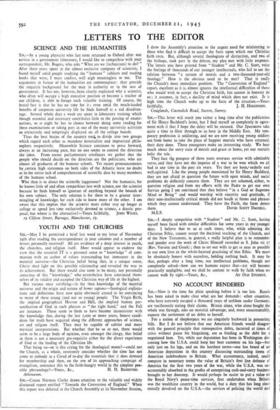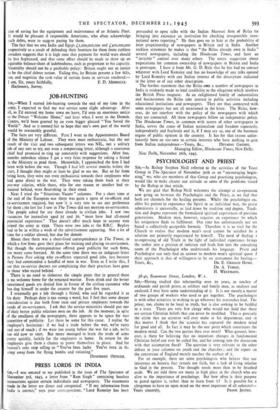NO ACCOUNT RENDERED
SIR,—Now is the time for plain speaking before it is too late. Russia has been asked to make clear what are her demands: other countries, who have narrowly escaped a thousand years of serfdom under Germany, are vociferously stating their claims. Britain alone, who alone fought the whole war through, asks no material advantage, and, more unaccountably, expects the settlement of no debts to herself.
For a nation of shopkeepers we are singularly backward in presenting bills. But I do not believe that our American friends would disag,ree with the general principle that retrospective debts, incurred at times of crisis without pause for bargaining, are as binding as the debt for a negotiated loan. Yet, while our deputation has been in Washington dis- cussing how the U.S.A. could keep her best customer on his legs—but only just on his legs, and on the harshest terms—one has heard of no American deputation in this country discussing outstanding items of American indebtedness to Britain. What accountancy, indeed, could compute in monetary terms the value of Britain's first line defence of America for the first two years of the war, while the U.S.A. was un- accountably absorbed in the profits of enterprising cash-and-carry business brought to her doorstep. It would perhaps be easier to put a value on the Royal Navy's peace-time services, first undertaken when Britain was the wealthiest country in the world, but a duty that has long since morally devolved on the U.S.A.—the services of policing the world and
also of saving her the equipment and maintenance of an Atlantic Fleet. It would be pleasant if responsible Americans, who often acknowledge such debts, were to suggest paying for them.
The fact that we owe India and Egypt ZI,2oo,000,000 and L400,000,000 respectively as a result of defending their frontiers for them from ruthless invaders suggests that it is high time that payment for world wars should be less haphazard, and that some effort should be made to draw up .an equitable balance-sheet of indebtedness, each in proportion to his capacity. Neutrality should not be _a profitable policy: Britain ought not in justice to be the chief debtor nation. Failing this, let Britain present a few bills, too, and negotiate the cash value of certain loans in services rendered.—































 Previous page
Previous page